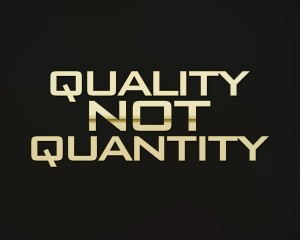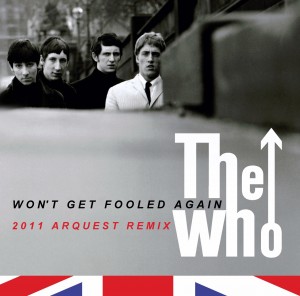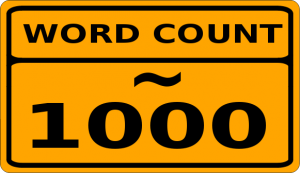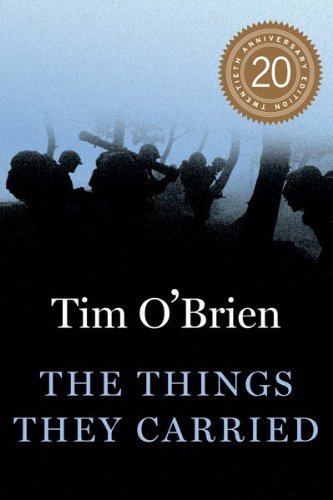 Did you ever, even once in your life, dismiss a song you loved because its length didn’t meet some standard you’d been convinced by the culture is appropriate for a particular style of music?
Did you ever, even once in your life, dismiss a song you loved because its length didn’t meet some standard you’d been convinced by the culture is appropriate for a particular style of music?
I grow weary (and even a bit perturbed) at hearing writers talk about their books in terms of size (i.e. word count). And when I say “talk” I mean references as to how far they are in the process of writing. Novellas, Novels, 50K words, 120K words. What does it matter? The story is what it is. Quantity in terms of a story/novel means nothing. Yes, yes, I totally get that a reader wants to be immersed in a story as long as possible. But as an author, you write the story and that’s IT. Too many authors in my opinion have some number in their head (say, 100K words) and they talk about it like the novel is “half done because I’m at fifty thousand words”.
 What? That’s like saying a song should be five minutes long, exactly. Tell that to The Who in regard to Won’t Get Fooled Again; or suggest to The Doors that they should never have put Light My Fire out until it was shortened by six minutes.
What? That’s like saying a song should be five minutes long, exactly. Tell that to The Who in regard to Won’t Get Fooled Again; or suggest to The Doors that they should never have put Light My Fire out until it was shortened by six minutes.
Hogwash. The story (like the song) is done when it’s done, and adding filler to reach a particular word count is the worst thing a writer can do from a quality perspective.
It’s not any author’s fault. The culture has perpetuated these numbers for decades. Now from a pricing perspective, I can see moving the numbers a bit to a point. A short story should probably be less than a much longer piece. However, anyone who has read Tim O’Brien’s The Things They Carried might argue with you on that point as well. I’d rather pay $10 for that than the entire Shades of Grey trilogy.
 And therein lies the rub. It should be about the story. If it takes 150K words to tell it perfectly, then so be it. Don’t let anyone tell you otherwise. And if it takes 40K, same thing. Should you charge a buck less for the 40K book? I don’t happen to think so, but I wouldn’t consider it an unreasonable decision. Again, I think it depends on the quality of the book and your own belief in it. What would be unreasonable is for the writer to take that 40K book and put more and more filler into it until it was 80K, just to reach a “word count” goal. A story doesn’t have a word count until it is finished. THEN you know what the word count is. As far as having word count dictated to you by other writers (and even editors)?
And therein lies the rub. It should be about the story. If it takes 150K words to tell it perfectly, then so be it. Don’t let anyone tell you otherwise. And if it takes 40K, same thing. Should you charge a buck less for the 40K book? I don’t happen to think so, but I wouldn’t consider it an unreasonable decision. Again, I think it depends on the quality of the book and your own belief in it. What would be unreasonable is for the writer to take that 40K book and put more and more filler into it until it was 80K, just to reach a “word count” goal. A story doesn’t have a word count until it is finished. THEN you know what the word count is. As far as having word count dictated to you by other writers (and even editors)?
Just. Say. No.
 DISCLAIMER: If it’s Simon & Schuster or Penguin telling you that your book needs to be shorter (or longer) then you have a personal, ethical quandary on your hands. (Were it one of the Big Five wanting me to spew out or cut back twenty thousand words, I’d probably end up doing my best to comply—just being forthright; I’m not above selling out some of my principles for fame and fortune.)
DISCLAIMER: If it’s Simon & Schuster or Penguin telling you that your book needs to be shorter (or longer) then you have a personal, ethical quandary on your hands. (Were it one of the Big Five wanting me to spew out or cut back twenty thousand words, I’d probably end up doing my best to comply—just being forthright; I’m not above selling out some of my principles for fame and fortune.)
Otherwise, you are in control. Tell the story. That’s the writer’s job—as Anaïs Nin stated: “not to say what we all can say, but what we are unable to say.” Nothing about the delivery of word count.
And seriously, if you have not read The Things They Carried, do so now:
(The short story is the first chapter of the book.)




R.S.,
Totally agree on the word count. In the old days of just print it was common for a novel to have to break the “300 page” barrier to be considered.
I see 50-100 eBooks a day and it seems to me that the average length is usually less than 300 pages.
Could the rise of eBooks actually shorten the length of novels? Maybe and this is not always a bad result.
Yeah, certainly the cultural feeling about word count comes from the traditional publishers wanting a 300+ number “back in the day” (and probably today as well). I feel like self-publishing allows the freedom to tell the best, most concise story required. In other words, it puts the control back in the writer’s hands. Thanks for the comment, Anthony! 🙂
I totally agree. I never read a book because of how many pages it has. If the author tells the story in such a way that holds my interest and makes the book difficult to put down, then they are truly a writer. The same goes when I create music. I never think about the length of a song, only that my song tells whatever story was trying to come out.
Thanks for the comment, Don. The story, whether it’s through a book, song, or even a movie, needs what it needs. It’s like saying “every road must be 100 miles long”. Well what about the one between the two towns that are 50 miles apart? 😉
Completely agree here. In fact I was writing a post about near the same thing. Word count to me is more of an old selling mechanism for big print publishing houses. The book had to have a certain heft, a certain thickness for it to be perceived as ‘sellable.’ Half the books I read these days still fall under that spell and could use a massive paring down. Makes me wonder how many good books could have been great without all the word count filler added in.
Good to hear from you, Brandon! Yep, nothing worse than useless words. Seems like that should be a quote. 😉 Thanks for the comment. 🙂
The Things They Carried is my favorite book, I think it should be required reading anytime someone picks up 50 Shades of Grey. You have to buy and read both. Period.
I think The Things They Carried is too much of a reward for someone who buys 50 Shades of Grey. 😉
Excellent post! I once wrote a book that ran to 190,000 words because it need that many to tell a really big story. My most recent novel ended up at 53,000 words. Very different stories equal very different word counts.
Perfect examples. The word count is determined by one thing and one thing only: the end of the story. 🙂
Another great blog, Rob. I admit in the past I was guilty of watching the word count at the bottom of my screen and using it as a gauge on whether I was done with a chapter, a short story, sometimes even a blog. But I soon realized, the story is done when it’s done. As a reader I can always tell when a story has been forced and that’s one offense I don’t want to be guilty of. Again, great blog and great comments from everyone.
I’ve never been concerned with word count in the least. My fingers know when the story’s run its course. They simply stop typing! I can feel a hard stop in my gut when the wall is reached. Best to listen to it, even if I thought I had more to say. Each time, now I look back at it, less turned out to be more.
I count words when I’m writing purely as a measure of my output, but not in reference to how complete the book is, because I don’t know how many words it will be until complete. I could count hours, but an hour producing 5 words is clearly not an hour well-spent, whereas an hour producing 1000 words is a reasonable output. So in that sense, it solely helps to keep me motivated.
But in terms of how long a story should be…. My WIP is 95,000. I told this to an editor at Harper Collins Australia, who said she had never published anything less than 115,000 in that genre – but, she added, a story is done when it’s done. I can’t find much to disagree with in that statement.
You get in. You tell the story. You get out. Word counts are something for entry level editors to worry about and, unfortunately, they do. You can’t judge a book by its cover, nor can you judge it by the word count. You judge it by how many times it made you laugh or cry or shocked you.
This post could not have come at a better time. Am in the process of finishing my first book and have been fighting anxiety over its relatively short length. While stopping before randomly slamming in words to beef up the fnal total, I see now that I have been wasting my time second guessing what is hopefully a refreshing brevity. Thanks for the boost to my confidence.
I completely agree. I think it’s fine if you have a set time or word count to write a day, but otherwise, it’s just ridiculous for a writer to try and write a specific word count. My 2nd book was 30,000 words, not much, and I didn’t really want to shorten it but was able to shave off 2,000 words. They didn’t need to be there, and I don’t want to waste the reader’s time with non-important passages- they should be reading a full quality book. Not a full quantity book. My dad always tells me this — Quality not Quantity. And it’s true. Great post Rob!
Preach it, brother.
Absolutely– a story is done when it is done. I keep track of word count, as a measure of my output, cos if I don’t, I would slack. But any short story or novel is about its story and not its word count—we can’t compare Old Man and the Sea and The Lord of the Rings series– they’re different stories, and their authors wrote two different, equally classic sagas.
I’m not sure I entirely agree. Having a standard word count for certain genres isn’t necessarily a bad thing. A 90,000 word urban fantasy novel, for example, may be set at 90,000 words because that’s how long other books in that genre have been, and it’s proved that it has worked for readers in the past. I’m not saying you should aim for a certain word count, but having structure (a beginning, middle and end) and having a notion for how long each of these parts should be in order to fully engage the reader is a GOOD thing. If word count helps provide the writer with that structure, then I’m all for it. If you have to add or shave off some words after you’re done, that’s fine too. But structure must be there, and the average word count for different genres helps define the limits of this structure.
Every writer is different. Cormac MacCarthy is never going to write a 100,000 word novel with his sparse, gorgeous use of language. Tolstoy, Proust, or Ayn Rand were likely never going to produce a novel under 500,000 words. Period.
Rough numbers for certain genres that really do require a suggested number are fine, but the bottom line is, if someone writes an Urban Fantasy story in fewer than 90,000 words and it’s better than most of the stuff out there, I would not think that writer would change it (and the real point is that if he/she were to add 20,000 words of pure filler, THAT is the real fly in the soup).
I do get that there are genre’s that readers expect longer books (like urban fantasy, and even fantasy in general), but if I am an excellent Urban Fantasy novelist I’m guessing my stories are going to be that long anyway, because that’s just how much it normally takes to tell the story (which is what you are saying, I think). I’m just saying you can’t take a general novel and say “it must be 80,000 words.”
Thanks for the comment, M.D. Great addition to the conversation! 🙂
I think the days of word-counts and page counts are numbered (no pun intended) because of e-books. This gives an author the freedom to concentrate on the story and nothing else.
Having said this I agree with Ciara Ballintyne about the advantages of counting words when I write.
It motivates and gives a sense of my progress or otherwise. I also find it helps me get a grip of the overall structure of the story and the flow.
Absolutely, I think word counts are great for a daily basis or whatever (i.e. to motivate, talk about how far you got, etc.). And I think your observation on the eBook contribution to the death of word counts poured in concrete is spot-on as well. Thaks for the comment, Martin. 🙂
Ah, thanks for the article. I have been struggling with the word count on a work in progress. I love writing about the complexity of life. It seems that when one problem hits, seven others follow. I want to write about how people cope during those times. This means too many words according to today’s sparse fashion. I understand the economics of size in the print world. In the e-publishing business, who cares?
I don’t understand why I didn’t read this post before… Anyways, all I want to say is: AMEN.
🙂 I agree (of course, seeing that I wrote the post). It’s silly to measure one against the other…a book’s done when it’s done. It’s not like a cake. 😉